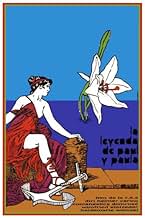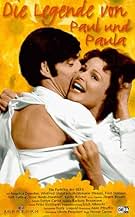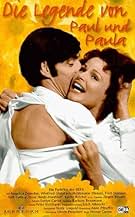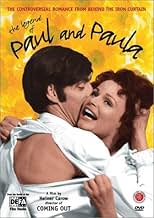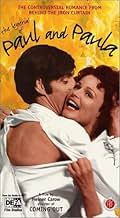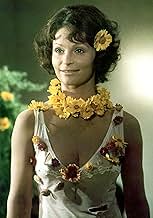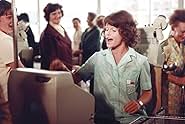IMDb-BEWERTUNG
6,8/10
1316
IHRE BEWERTUNG
Paul und Paula haben schlechte Erfahrungen mit der Liebe gemacht: Paul ist finanziell gut gestellt, hat aber jede Zuneigung zu seiner Frau verloren, und Paula führt ein mühsames Leben, weil ... Alles lesenPaul und Paula haben schlechte Erfahrungen mit der Liebe gemacht: Paul ist finanziell gut gestellt, hat aber jede Zuneigung zu seiner Frau verloren, und Paula führt ein mühsames Leben, weil sie zwei Kinder alleine großzieht.Paul und Paula haben schlechte Erfahrungen mit der Liebe gemacht: Paul ist finanziell gut gestellt, hat aber jede Zuneigung zu seiner Frau verloren, und Paula führt ein mühsames Leben, weil sie zwei Kinder alleine großzieht.
- Regie
- Drehbuch
- Hauptbesetzung
Frank-Otto Schenk
- Kollege Schmidt
- (as Frank Schenk)
Empfohlene Bewertungen
Die Legende von Paul und Paula captures the spirit of the changes and upheavals of the late 1960ies / early 1970ies upheaval like no other film. Outstanding acting and the on-screen chemistry between Angelica Domröse and Winfried Glatzeder (basically they're the Brangelina of early 1970ies East Germany) make up for the movie's slow and somewhat inane first third, and some dated flourishes such as the Sergeant Pepper-style scene on the barge. The movie manages to convey that the GDR wasn't the worker's paradise many like to remember it as, without ever being in-your-face type of critical.
Unlike some reviewers have hinted, the movie was never banned in the GDR, although it can't have been popular with the party big whigs. In fact it was even the most popular homegrown movie on the other side of the wall.
Unlike some reviewers have hinted, the movie was never banned in the GDR, although it can't have been popular with the party big whigs. In fact it was even the most popular homegrown movie on the other side of the wall.
It's kind of weird. Angelica Domröse speaks in the movie of a Banana and why it's bent, yet she as an actress has probably never seen one. Also her parents most likely chose her name 'Angelica' (note: the name is spelt 'Angelika' in any German-speaking country) to mock the Soviet system and give credit to the American way of life. Just like pretty much anyone else in the GDR (note: if ever you meet a girl in Europe named 'Doreen', 'Melissa' or 'Mandy', it's pretty safe to say that she's from East Germany).
Pretty much all of the home appliances shown are authentic, yet they had to introduce coffee and cosmetics (which didn't really exist in the GDR at that time) to make it suitable for the political demagogues. Imagine it: the fact that there is a sentence in English ("excuse me, only one glass for you") could have led to a total ban of the entire movie.
What else is there to say? Try to understand the lyrics of the Band 'Puhdys' featured manifold in this flick and the in-between-the-lines-messages and how this was important to get thoughts of freedom past the GDR's government's census.
Well you guys probably don't and will never understand what kind of fruit GDR's socialism sprouted, but watching 'Paul and Paula' could theoretically help you get at least a glimpse.
Pretty much all of the home appliances shown are authentic, yet they had to introduce coffee and cosmetics (which didn't really exist in the GDR at that time) to make it suitable for the political demagogues. Imagine it: the fact that there is a sentence in English ("excuse me, only one glass for you") could have led to a total ban of the entire movie.
What else is there to say? Try to understand the lyrics of the Band 'Puhdys' featured manifold in this flick and the in-between-the-lines-messages and how this was important to get thoughts of freedom past the GDR's government's census.
Well you guys probably don't and will never understand what kind of fruit GDR's socialism sprouted, but watching 'Paul and Paula' could theoretically help you get at least a glimpse.
This is a film from the time when you only saw Trabant (GDR-made) and Volga (Soviet-made) cars on the streets. It is a sad love story, set among the ruins of old German houses and the new blocks of socialism. In the soundtrack we hear some songs by the band from DDR Die Puhdys, unfortunately not the best from their repertoire, actually some very bad, they having some really excellent ones, being the most valuable rock band in communist Germany. For a film made in that period, when in countries like GDR, Poland, Romania, Bulgaria, Czechoslovakia, Hungary, Albania the films were nothing but communist propaganda, this film is a
real exception, being very libertine, something inexplicable how it got away of the fierce censorship of the regime. In Yugoslavia the situation was different, they were much freer. And, there were bolder films in Hungary, Poland, Romania, but they were banned soon after release or scenes were cut. Angelica Domröse plays a role full of courage, totally unconventional for the politics behind the iron curtain. Scenes of sex and alcohol consumption could not be seen in those films of communist countries where everyone had to appear happy, without problems, living a wonderful life, in a perfect society, where children were brought by storks, not being the fruit of a sexual act between a man and a woman.
The Legend of Paul and Paula seems simple yet not boring. However, the film has profound ideas to tell gender roles, social inequality and escapism. I like the film's way portraying of everyday life in East Berlin. You can almost see and feel the city. The love story between a passionate single mother and a complacent, married bureaucrat is not your typical Hollywood movie. The film also has a psychedelic and hippie feel. The soundtrack suits the film. I like the portions of the film where some elements (like the band that plays music while Paul and Paula are making love) are placed for no reason. The movie has a simple charm that captivates audiences. I guess that the film's success lies in its way of making the ordinary scenes of life extraordinary.
"Die Legende von Paul und Paula" (1973), co-written and directed by Heiner Carow, is a famous film in Germany. The story seems tame enough now--a young woman is dissatisfied with her life and takes active steps to improve it.
Angelica Domröse plays Paula, a single mother who has a dead-end job and no social life. Winfried Glatzeder portrays Paul, who is unhappily married and is drawn to the free-spirited Paula. (Glatzeder has been called East Germany's Jean-Paul Belmondo. He didn't look much like Belmondo, and wouldn't have struck me as leading man material. However, I don't know enough about East German cinema to be aware of his competition.)
I've been told that the reason for this film's popularity in East Germany was because it contained subtle criticism of the regime, as well as depicting some PG-13 sex. I know East German films were subject to strict censorship, and, as in any similar regime, directors inserted criticisms in ways that were necessarily very indirect and symbolic.
The problem is that this movie only works if you can think of how you would have viewed it in East Berlin in 1973. I don't believe it's strong enough to succeed on its own merits in 2006.
Angelica Domröse plays Paula, a single mother who has a dead-end job and no social life. Winfried Glatzeder portrays Paul, who is unhappily married and is drawn to the free-spirited Paula. (Glatzeder has been called East Germany's Jean-Paul Belmondo. He didn't look much like Belmondo, and wouldn't have struck me as leading man material. However, I don't know enough about East German cinema to be aware of his competition.)
I've been told that the reason for this film's popularity in East Germany was because it contained subtle criticism of the regime, as well as depicting some PG-13 sex. I know East German films were subject to strict censorship, and, as in any similar regime, directors inserted criticisms in ways that were necessarily very indirect and symbolic.
The problem is that this movie only works if you can think of how you would have viewed it in East Berlin in 1973. I don't believe it's strong enough to succeed on its own merits in 2006.
Wusstest du schon
- WissenswertesFemale DEFA-director Ingrid Reschke made preparations for the film, but her life was tragically cut short in a car accident, and Heiner Carow took over the project. He dedicated the film to her memory.
- VerbindungenEdited into Der nackte Osten - Erotik zwischen oben und unten (1994)
- SoundtracksGeh zu Ihr
Music by Peter Gotthardt
Lyrics by Ulrich Plenzdorf & Peter Gotthardt
Performed by Puhdys
VEB Deutsche Schallplatten Berlin AMIGA
Top-Auswahl
Melde dich zum Bewerten an und greife auf die Watchlist für personalisierte Empfehlungen zu.
- How long is The Legend of Paul and Paula?Powered by Alexa
Details
Zu dieser Seite beitragen
Bearbeitung vorschlagen oder fehlenden Inhalt hinzufügen

